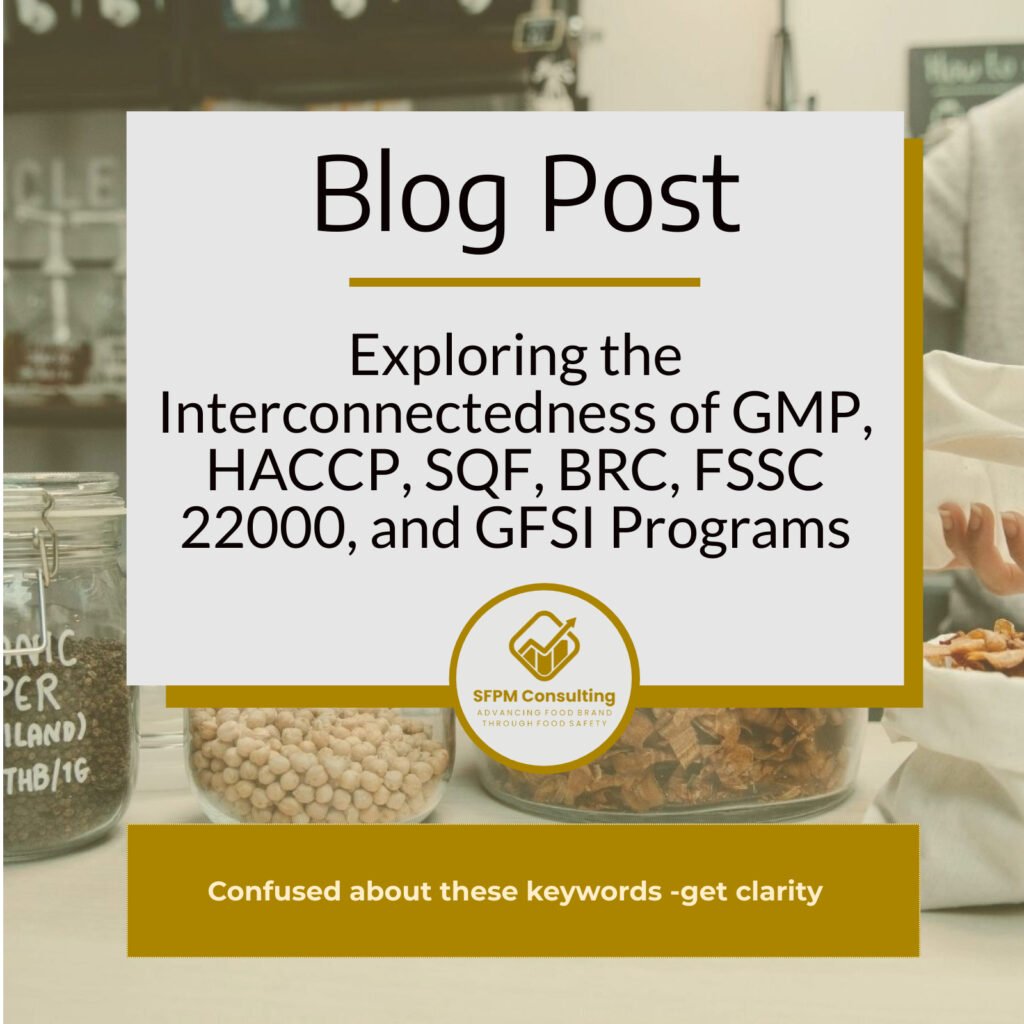The food industry is a complex ecosystem that involves multiple stakeholders, including farmers, manufacturers, processors, distributors, retailers, and consumers. One of the primary concerns of the food industry is ensuring food safety and quality, as foodborne illnesses can have severe health consequences for consumers and cause economic losses for businesses. Several food safety and quality programs have been established to address this concern to set standards, guidelines, and certification schemes.
This article will explore the relationships between six key programs: HACCP, SQF, BRC, FSSC 22000, GMP, and GFSI, and how they work together to create a robust food safety and quality system.
GMP (Good Manufacturing Practices) is a set of guidelines and standards that outline the minimum requirements for ensuring the safety and quality of products in the food industry. GMP covers facilities, equipment, personnel, production processes, and documentation. GMP is a prerequisite for many food safety certification programs.
GFSI (Global Food Safety Initiative) is a global collaborative effort by food industry stakeholders to enhance food safety and reduce foodborne illnesses worldwide. GFSI benchmarks and approves food safety certification programs that meet globally recognized food safety and quality standards. GFSI develop standards andsets benchmarking requirements for food safety certification programs to ensure that they meet minimum requirements for food safety management systems. GFSI-approved certification programs assure customers, regulators, and other stakeholders that food products are safe, high-quality, and meet legal and regulatory requirements.
HACCP (Hazard Analysis and Critical Control Points) is a systematic approach to identifying potential hazards in the food production process and setting preventive measures to control them. HACCP is a risk-based approach that involves seven principles: hazard analysis, identification of critical control points (CCPs), establishing critical limits, monitoring, corrective actions, record-keeping, and verification. HACCP is a widely recognized and implemented program in the food industry and forms the basis for other food safety and quality programs.
SQF (Safe Quality Food) is a food safety certification program that systematically manages food safety risks and quality in the food industry. SQF covers many topics, including food safety management systems, HACCP, food defense, and quality management systems. SQF certification is recognized by the Global Food Safety Initiative (GFSI), which benchmarks and approves food safety certification programs that meet globally recognized standards.
BRC (British Retail Consortium) is a food safety and quality certification program that sets standards for food safety, quality, and legality across the food industry supply chain. BRC covers food safety management systems, HACCP, quality management systems, and product specifications. BRC certification is also recognized by GFSI, which means it meets globally recognized food safety and quality standards.
FSSC 22000 (Food Safety System Certification) is a food safety management system that combines ISO 22000:2018, which outlines food safety requirements, with prerequisite programs (PRPs) and HACCP to provide a comprehensive food safety management system. FSSC 22000 is also recognized by GFSI, which means it meets globally recognized food safety and quality standards.
The relationships between these six programs are interconnected, as they complement each other to provide a robust food safety and quality system. GMP is a set of guidelines and standards that outline the minimum requirements for ensuring the safety and quality of products in the food industry. GMP is a prerequisite for many food safety certification programs and provides a baseline for manufacturing practices. HACCP is the foundation for most food safety and quality programs and provides a risk-based approach to identify potential hazards and set preventive measures.
SQF, BRC, and FSSC 22000 are certification programs that build on the principles of HACCP and provide a comprehensive food safety and quality management system. These programs cover food safety management systems, HACCP, quality management systems, and product specifications. They also require regular audits and assessments to ensure compliance with the standards.
GFSI benchmarks and approves food safety certification programs that meet globally recognized food safety and quality standards. GFSI-approved certification programs assure customers, regulators, and other stakeholders that food products are safe, high-quality, and meet legal and regulatory requirements.
The relationships between these programs also extend to the supply chain, as food safety and quality management systems require stakeholder collaboration and coordination.
Certification programs such as SQF, BRC, and FSSC 22000 require suppliers to meet certain standards and provide evidence of compliance. This requires a robust communication system, documentation, and verification among suppliers, manufacturers, and retailers.
GFSI also promotes collaboration and partnerships among stakeholders in the food industry to enhance food safety and reduce foodborne illnesses worldwide.
In conclusion, the food industry is a complex ecosystem that involves multiple stakeholders and requires a robust food safety and quality management system to ensure the safety and quality of food products. HACCP, SQF, BRC, FSSC 22000, GMP, and GFSI are six key programs that work together to provide a comprehensive food safety and quality system.
HACCP is the foundation for most food safety and quality programs, while SQF, BRC, and FSSC 22000 are certification programs that provide a comprehensive food safety and quality management system. GMP provides a baseline for manufacturing practices, while GFSI benchmarks and approves food safety certification programs that meet globally recognized food safety and quality standards. These programs also require collaboration and coordination among stakeholders in the food industry to ensure the safety and quality of food products.

